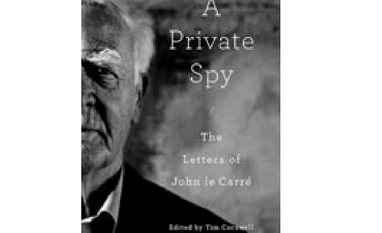A Private Spy: The Letters of John Le Carre 1945-2020
Editor: Tim Cornwell
Publisher: Penguin
Pages: 752
Price: Rs 2,202
The analogy would be limited overs cricket and Test cricket. Ian Fleming provides mass delight; John Le Carre (the pen name of the writer David Cornwell) whets the connoisseur’s appetite. The latter, who was also a spy, was, in addition to being a bestselling spy novelist, a prodigious letter-writer. A selection of his correspondence has now been published in an anthology edited by his son, and it is vintage Le Carre.
On October 15, 1963, he wrote to his stepmother Jean Cornwell addressing her as “Dearest Old Horse”. He went on: “I thought you’d like to know about the progress of the book [The Spy Who Came in From The Cold]… we’ve sold around 20,000 in England already, which is quite something. Dell’s, the US paperback firm, have paid an all-time record for a thriller of $25,000 advance.”
Then, referring to his first wife Ann Sharp, he said: “Ann mouse has become very severe since she’s discovered she’s married wealth. Not at all sure she approves. It’s all right, I suppose, as long as you don’t enjoy it. Like sex on Sundays.”
In May 1966, he wrote a revealing open letter to the editor of Literaturnaya Gazeta, a Soviet publication that had reviewed the book. “Mr Voinov [the critic], I suspect, smelt in my writing the greatest heresy of all: That there is no victory and no virtue in the Cold War, only a condition of human illness and a political misery. And so he called me its apologist (he might as well have called Freud a lecher).”
More interestingly, he expressed in the same note an opinion on Fleming’s hero. “James Bond, on the other hand, breaks no such Communist principles. You know him well. He is the hyena who stalks the capitalist deserts, he is an identifiable antagonist, sustained by capital and kept in good heart by the charms of materialist society; he is a chauvinist, an unblinking patriot who makes espionage exciting. Bond on his magic carpet takes us away from moral doubt, banishes perplexity with action, morality with duty. Above all, he has the one piece of equipment without which not even his formula would work: An entirely evil enemy.”
Sir Alec Guinness was to play Smiley, the protagonist in several Le Carre classics, in a BBC TV series Smiley’s People based on Le Carre’s 1979 novel. Before this, he wrote to the author seeking his views on whether he would fit the character. Cornwell replied on March 3, 1978: “Let me go straight to your points. 64 is the ideal age. Smiley can’t be less, arithmetically, and I fear that he may be more, though I have deliberately arrested the passage of time in the later books! So nobody is at all worried on that score, and you must not be either.”
He continued: “Some actors can act intelligent. Others are intelligent and come over dull, because of some mannerism which gets in the way. And a very few are intelligent and convey it: In Tinker Tailor [Soldier Spy], this gift will be pure gold, because it gives such base to other things — the solitude, the moral concern, the humanity of Smiley — all because of the intelligence of his perceptions, grow under our eyes and in your care.”
On a visit to Moscow, Cornwell was asked if he wanted to meet Kim Philby, who had defected from Britain’s external intelligence agency MI6 to the Soviet Union. On September 24, 1987, he confided to Sir John Margetson, an old friend in MI6: “My best moment was being offered a chance to meet Philby, which I declined.”
In 1994, the celebrated writer found an article in The New York Times about Philby “ludicrous” and “crowded with inaccuracies”; and he communicated his views quite scathingly to a foreign correspondent for Newsweek Edward Behr on August 1 of that year. “Both Philby and [George] Blake [who also spied for and defected to the Soviet Union] effectively crippled SIS [Secret Intelligence Service, another name for MI6] liaison and field operations at the middle levels for years and years…. What we saw was what we got: A nasty little establishment traitor with a revolting father, a fake stammer and an anguished sexuality who spent his life getting his own back on the England that made him.”
In 2011, Gary Oldman, who played George Smiley in the film adaptation of Tinker Tailor Soldier Spy, thanked Cornwell for the latter’s “generous and flattering words” about his acting. The response was: “I love the movie, love your Smiley, and that’s a constant… I’ve got a hundred quid at 10-1 on winning at [the] Venice [film festival].”
Cornwell was shattered by Britons voting for Brexit. On July 29, 2017, he told Keith FitzPatrick, a fan of his for 40 years: “Just now I’d rather be Dutch, German, French, or for that matter Polish, than a Brit subjected to this truly shaming process in which we are engaged.”
Then to another fan William Burroughs on July 23, 2018: “I would be puzzled to know, if I were in Putin’s position, how to run Donald Trump as my asset. I have no doubt that they have obtained him….”
Cornwell died in December 2020. A Private Spy is likely to be appreciated by the initiated, but perhaps not by those besotted by Bond.
Unlock 30+ premium stories daily hand-picked by our editors, across devices on browser and app.
Pick your 5 favourite companies, get a daily email with all news updates on them.
Full access to our intuitive epaper - clip, save, share articles from any device; newspaper archives from 2006.
Preferential invites to Business Standard events.
Curated newsletters on markets, personal finance, policy & politics, start-ups, technology, and more.
)